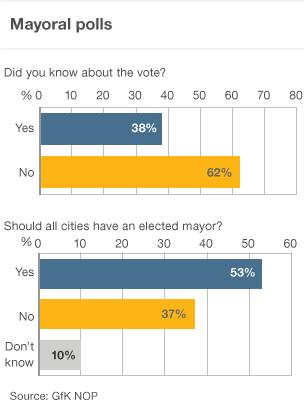Elected mayors: Cities Minister 'not surprised' at poll findings
- Published

The Minister of Cities has said he is "not surprised" by the results of a poll which suggests the majority of people in Yorkshire cities are ill-informed about a forthcoming referendum over elected mayors.
On 3 May people in 10 cities, including Leeds, Sheffield, Bradford and Wakefield, will be given the opportunity to decide whether they want an elected mayor.
Doncaster residents will also vote on whether they want to keep the current mayoral system.
The model gives people a chance to directly elect a leader, rather than councils picking who is in charge.
The alternative system, which is used by most councils in the UK, is to have a council leader and a cabinet of councillors.
The government believes elected mayors can provide cities with a strong, visible leadership but opponents argue it is too much power in one person's hands.
An opinion poll conducted by Gfk NOP for the BBC suggested that almost two-thirds of respondents did not know there was going to be a referendum.
The company surveyed 500 people each in Leeds, Sheffield, Bradford, Wakefield and Doncaster.
Of the 2,500 respondents, 90% said they had been given little or no information about the vote in May.
Only 8% felt they had been given the right amount of information.
'Big figures'
The Minister for Cities Greg Clark said he was "not surprised" by the response.
He said: "It was only a few weeks ago that the debate in Parliament took place to trigger the referenda.
"Between now and May it is the responsibility of the returning officers locally to publicise the fact of the referenda... so during the weeks ahead people will be informed about it."
Although the survey suggested a lack of knowledge about the referendum, it indicated the majority of people were in favour of a mayoral system for their councils.
Some 53% of people said they would like an elected mayor with 37% disagreeing and 10% undecided.
The poll suggested support for an elected mayor was strongest in Doncaster where the system has been in place since 2002, with 59% of people in favour.
Peter Davies of the English Democrats has held the post in the town since June 2009.
Mr Davies said he believed the system was "pure democracy".
Polling in Wakefield suggested support for the new system was weaker than elsewhere in the region, with 47% responding that they wanted an elected mayor.
Mr Clark said: "I think the leaders of our great cities ought to be so well-known and so vigorous in standing up for their cities that they should be big figures on the national and international stage."
The decision to have a referendum on the issue was taken after a three-month public consultation on the issues in Autumn 2011.
If a city votes in favour in the referendum, elections for mayors would then happen on 15 November.
Mayors would be elected for four-year terms.
- Published1 February 2012
- Published19 September 2011
- Published6 December 2010